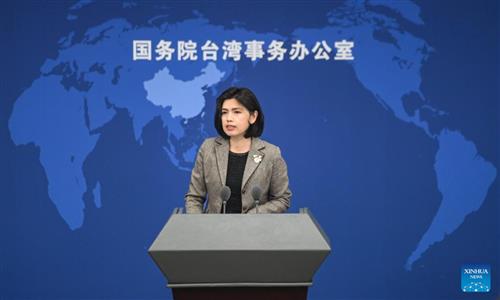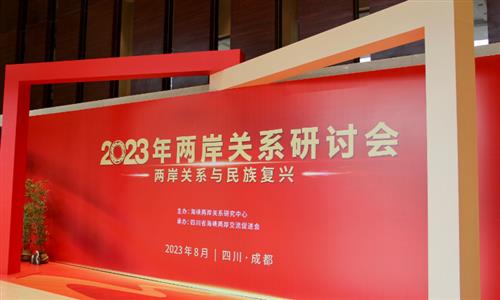DPP is so afraid this policy boon is known by people of Taiwan: Global Times editorial

This aerial photo taken in Xiamen, Fujian Province on June 5, 2023 shows the view of Kinmen county, Taiwan island. Photo: VCG
China's plan to make Fujian Province a demonstration zone for the integrated development across the Taiwan Straits, jointly issued by the Communist Party of China Central Committee and the State Council on Tuesday, is an important measure to promote cross-Straits integrated development and the process of peaceful reunification, and a major policy boon for the people of Taiwan.
This circular of more than 4,000-words, with 6 major items and 21 specific measures, presents a panoramic view and visualization of the future scenarios of cross-Straits integration and development, especially for Taiwan compatriots who will develop on the mainland, and it stipulates specific provisions to ensure the effect of the policy on the ground. For the people of the mainland and Taiwan, this means not only personal opportunities and development, but also genuine and lasting peace. It is obviously a policy of great strength and breadth to benefit Taiwan, but its significance is not limited to the economic, social and cross-Straits exchanges. More importantly, it is the fruit of the Chinese government's comprehensive thinking on cross-Straits integration and development, and it also reflects the CPC Central Committee's utmost sincerity for peaceful reunification and utmost goodwill toward the compatriots in Taiwan. Anyone who hopes for peace and stability as well as for the shared well-being of people on both sides of the Taiwan Straits will not reject such goodwill.
On the same day, defense authority of Taiwan region released its latest defense report, claiming that "reservists may have to attend urban warfare." The two documents, one is talking about peace and the other about war; one focuses on development and the other on destruction, outlining two diametrically opposed destinies for Taiwan island. The move of the DPP authorities in Taiwan is not only deliberately opposed to the mainland, but also opposed to the interests and wishes of people on both sides of the Taiwan Straits.
The DPP authorities have always been afraid that the people on the island will feel sincerity and goodwill from the mainland. This time, they have deliberately ignored the impact of the circular through self-deception by burying their head in the sand. On the other hand, they have distorted and discredited the circular and made every effort to mislead the people on the island. A DPP legislator said that the circular was "digging a hole for the Taiwanese to jump into", which is one of the typically vicious and distorted remarks.
We must admit that the DPP has a skillful approach to deceiving the people on the island. If we want more compatriots in Taiwan to receive and accurately understand the decisions and deployments of this circular, there is still much work to be done. Fujian, as a demonstration zone for exploring cross-Straits integrated development, as long as the central government's policies are implemented well, will undoubtedly create a demonstration effect, win the reputation among Taiwan compatriots and enterprises, and fundamentally establish immunity against the DPP's manipulation of public opinion.
According to data released on September 11 by the executive authority in Taiwan, since Tsai Ing-wen took office in 2016, investment from Taiwan in the mainland has sharply declined by 44 percent, while investment in other countries and regions have surged by 96 percent. This data, which the DPP touts as an achievement, is actually a consequence of the DPP's various measures to sever economic and trade ties across the Taiwan Straits. The DPP has intensified political opposition and hostility towards the mainland, promoted economic "decoupling" from the mainland, made deliberate efforts in "de-Sinicization" in terms of culture and history, and increased military preparations and external collusion. These manipulations have created a very grim situation in cross-Straits relations.
The circular, issued in this context, has gone through a gradual deepening process. From the heartfelt call that "the two sides of the Taiwan Straits are one family," to the establishment of a demonstration zone for cross-Straits integrated development, the central government's policy on Taiwan has continuously advanced based on the actual development needs of Taiwan people in the mainland. This is conducive to further improving the business environment related to Taiwan, deepening cross-Straits industrial cooperation, and at the same time, it serves as a countermeasure to block the DPP's attempts to reverse the situation.
Economic and trade relationships are resilient; even in challenging times, they can find their way. However, when constrained by the political hostilities, progress can be extremely difficult. Both sides of the Taiwan Straits share a common language and origin, and blood runs thicker than water. In the face of political tension and economic and trade exchanges being obstructed, strengthening social connections between the two sides becomes particularly important. The establishment and practice of the Fujian demonstration zone will elevate both the depth and breadth of people-to-people exchanges across the Straits to a new level.
We must be fully prepared both psychologically and in our actions to counter the interference and disruption by the DPP as well as external forces. Based on the experiences of recent years, it's not difficult to discern that whatever the DPP vigorously promotes and celebrates with fanfare is typically detrimental to Taiwan's interests, undermining the foundation of peace across the Taiwan Straits. Conversely, what they deliberately avoid or protest against is often in the true interest of people on both sides of the Straits and conducive to cross-Straits peace and stability. The DPP's persistent "pro-independence" agenda, coupled with provocations from countries like the US and Japan, has been intensifying, which push us to continually strengthen our capacity to counteract separatist activities while advocating for peaceful reunification.



